Dental Hygiene Schools
How to Find the Right One Near San Francisco California
 The most important first step to start your new profession in preventive dentistry is to choose the ideal dental hygienist program near San Francisco CA. But prior to making your selection, you need to analyze and compare your school options. There is much more to performing your due diligence than picking the training with the lowest tuition or enrolling in the school that is closest to your residence. There are other crucial issues to take into account as well, such as the program's reputation and accreditation. A dental hygienist usually must spend anywhere from two to three years to earn an Associate Degree, as compared to a certificate typically earned by dental assistants in about half that time. Obviously with the lengthier training of a hygienist comes more cost. We will explore all of these considerations and additional questions that you need to be asking the dental hygienist schools you are evaluating later in this article. But first, let's review the duties of dental hygienists and the training programs provided.
The most important first step to start your new profession in preventive dentistry is to choose the ideal dental hygienist program near San Francisco CA. But prior to making your selection, you need to analyze and compare your school options. There is much more to performing your due diligence than picking the training with the lowest tuition or enrolling in the school that is closest to your residence. There are other crucial issues to take into account as well, such as the program's reputation and accreditation. A dental hygienist usually must spend anywhere from two to three years to earn an Associate Degree, as compared to a certificate typically earned by dental assistants in about half that time. Obviously with the lengthier training of a hygienist comes more cost. We will explore all of these considerations and additional questions that you need to be asking the dental hygienist schools you are evaluating later in this article. But first, let's review the duties of dental hygienists and the training programs provided.
It Takes Just a Few Minutes to Start Your Dental Hygienist Career Below
Dental Hygienist Job Functions

When comparing the role of a dental hygienist to that of an assistant, the most significant difference is probably that the hygienist works more independently. Dental assistants work with and assists the San Francisco CA dentists and the practice. Hygienists, while also supporting the practice, deal with the patients more on an individual basis. They are typically the first person a patient interacts with when called from the waiting room. They examine every patient's gums and teeth and present their findings to the dentists. They also may perform basic procedures. Based on state law, a hygienist's responsibilities may include:
- Removing tartar, stains and plaque
- Administering fluoride treatments
- Polishing teeth and applying sealants
- Instructing patients regarding oral hygiene
- Taking and developing X-rays
- Applying fillings and removing sutures
Dental Hygienist Degree Options
Because of the increased responsibility in contrast to an assistant, dental hygienists working in San Francisco CA dental offices are usually required to hold an Associate Degree in dental hygiene rather than a certificate. These programs can require anywhere from 2 to as long as 3 years to complete and must be accredited by the CDA in almost every state. They are offered in community colleges as well as trade and technical schools. And in addition to classroom studies learning the fundamentals of dental hygiene, there will be a clinical component to the training as well. Many programs also offer internships with local dentists or dental practices.Dental Hygienist Online Training
 Choosing an online dental hygienist college might be a good alternative for obtaining your training. Just keep in mind that the program will not be completely online, since there will be a practical component to your training. But the balance of your classes will be accessible by means of your desktop computer in the comfort of your San Francisco CA home or anywhere else on your tablet or laptop. For those continuing to work while going to school, online dental programs make education much more obtainable. Many may even offer lower tuition fees than their on-campus competitors. And additional expenses for items like commuting, books and school supplies may be lessened as well. The clinical training can usually be performed at an area dental practice or in an on-campus lab. With both the clinical and online training, everything necessary to get the appropriate education is provided. If you have the discipline for this mode of learning, you may find that attending an online dental hygienist program is the ideal choice for you.
Choosing an online dental hygienist college might be a good alternative for obtaining your training. Just keep in mind that the program will not be completely online, since there will be a practical component to your training. But the balance of your classes will be accessible by means of your desktop computer in the comfort of your San Francisco CA home or anywhere else on your tablet or laptop. For those continuing to work while going to school, online dental programs make education much more obtainable. Many may even offer lower tuition fees than their on-campus competitors. And additional expenses for items like commuting, books and school supplies may be lessened as well. The clinical training can usually be performed at an area dental practice or in an on-campus lab. With both the clinical and online training, everything necessary to get the appropriate education is provided. If you have the discipline for this mode of learning, you may find that attending an online dental hygienist program is the ideal choice for you.
Issues to Ask Dental Hygienist Programs
Now that you have decided to become a dental hygienist in San Francisco CA, you can start the process of comparing programs and schools. As we covered at the beginning of this article, many potential students begin by looking at the cost and the location of the colleges. Possibly they search for several online alternatives also. Although these may be significant initial points to consider, there are several additional questions that you need to ask of the colleges you are reviewing in order to make an informed decision. Toward that end, we have provided a list of questions to assist you with your due diligence and final selection of the right dental hygienist school for you.
Is the Dental Program Accredited? There are many important reasons why you should only enroll in an accredited dental hygienist school. If you are going to become licensed or certified, then accreditation is a requirement in almost all states. In order to take the National Board Dental Hygiene Exam, your dental college must be accredited by the Commission on Dental Accreditation (CDA). Accreditation also helps guarantee that the education you get is of the highest quality and comprehensive. San Francisco CA employers frequently prefer or require that job applicants are graduates of accredited schools. And last, if you are requesting a student loan or financial aid, usually they are not obtainable for non-accredited colleges.
Is Enough Practical Training Provided? Clinical or practical training is an important portion of every dental training program. This applies for the online college options also. Many dental hygienist schools have relationships with area dental practices and clinics that furnish practical training for their students. It's not only important that the program you enroll in offers enough clinical hours but also provides them in the type of practice that you subsequently would like to work in. As an example, if you are interested in a career in pediatric dentistry, check that the program you enroll in offers clinical rotation in a local San Francisco CA dental practice that specializes in dental services for children.
Are Internships Available? Find out if the dental schools you are exploring have an internship program. Internships are undoubtedly the most effective method to obtain hands-on, clinical experience in a professional dental practice. They help students to transition from the theoretical to the practical. They can also help students form professional relationships in the San Francisco CA dentistry community. And they look good on resumes too.
Is Job Placement Assistance Furnished? Many students that have graduated from dental hygienist programs require help obtaining their first job. Ask if the schools you are reviewing have job placement programs, and what their job placement rates are. Programs with high job placement rates probably have excellent reputations within the San Francisco CA dental profession in addition to broad networks of contacts where they can place their students for employment or internships.
Are Classes Small? Ask the programs you are looking at how large on average their classes are. The smaller classes usually offer a more personal setting for training where students have greater access to the teachers. On the other hand, bigger classes often are impersonal and provide little individualized instruction. If practical, ask if you can attend a couple of classes at the San Francisco CA dental hygienist college that you are most interested in so that you can witness first hand the level of interaction between instructors and students before enrolling.
What is the Entire Expense of the Program? Dental hygiene training can differ in cost depending on the duration of the program and the volume of clinical training provided. Other factors, for example the reputations of the schools and if they are public or private also come into play. But besides the tuition there are other substantial expenses which can add up. They can include expenses for such things as textbooks and commuting as well as school materials, equipment and supplies. So when comparing the cost of colleges, remember to add all of the expenses associated with your education. The majority of schools have financial aid departments, so make sure to ask what is offered as far as grants, loans and scholarships in the San Francisco CA area.
Are the Classes Convenient? Before selecting a dental hygienist college, you need to verify that the assistant or hygienist program furnishes classes that fit your schedule. This is especially true if you continue working while receiving your education and need to attend classes near San Francisco CA in the evenings or on weekends. And even if you select an online school, you will still need to schedule your clinical training classes. Also, while making your inquiries, ask what the make-up procedure is if you should need to miss any classes because of work, illness or family emergencies.
Learn More About How to Become a Dental Hygienist in San Francisco
Pick the Best San Francisco Dental Hygienist School
Selecting the right dental hygienist program is essential if you want to take the National Board Dental Hygiene exam or, if required in your state, become licensed. As you now know, there are numerous options available to receive your training and it takes a fairly short period of time to become a dental hygienist. You can receive your formal education through dental hygienist programs at junior colleges, technical institutes, trade schools and vocational schools. Graduates of these schools typically receive an Associate Degree. Dental Hygienists usually require roughly two years of studies prior to entering the job market. When earning a degree you can choose to go to classes online or on-campus. Whichever mode of training you decide to pursue, by asking the questions provided in this article you will be in a better position to make the best choice. And by doing so, you will be ready to start your journey toward becoming a dental hygienist in San Francisco California.
San Francisco Dental Hygienist Programs Near Me | San Francisco Dental Hygienist Degree
